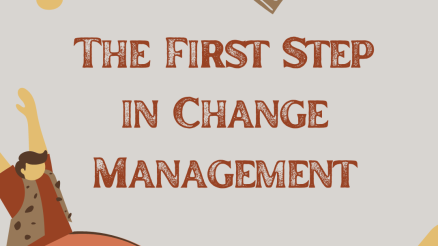Ethical behaviour play a crucial role in determining the positive outcome of change initiatives.
This blog post explains ethics in change management, exploring why it matters, the common ethical challenges faced, and how organizations can build a framework that promotes responsible and transparent change.
Whether you’re a business leader, a change agent, or simply curious about the dynamics of organizational transformation, join us on this journey to uncover the vital role ethics plays in shaping successful change endeavors.
Let’s check this out
What is Ethics in Context of Organizational Change?
In the context of organizational change, ethics refers to the principles and values that guide the conduct of individuals and the organization as a whole throughout the process of initiating, planning, implementing, and sustaining change.
It involves making morally sound decisions and choices that consider the impact of change on various stakeholders, including employees, customers, and the broader community.
Ethical behavior in change management encompasses transparency, fairness, honesty, and respect for the rights and well-being of those affected by the change.
It involves a commitment to integrity and accountability, ensuring that the change process aligns with the organization’s values and contributes positively to both internal and external relationships.
Importance of Ethics in Change Management
The importance of ethical considerations in guiding change initiatives cannot be overstated, as it plays a pivotal role in shaping the overall success and sustainability of organizational transformations.
Here are several key reasons highlighting the significance of ethics in the context of change management:
Trust and Credibility:
Ethical behavior builds trust among stakeholders, including employees, customers, and partners. When change initiatives are guided by ethical principles, it enhances the organization’s credibility and builds a positive relationship with those affected by the change.
Employee Engagement and Morale:
Ethical decision-making contributes to a positive organizational culture. Employees are more likely to engage and participate actively in change efforts when they perceive that the process is fair, transparent, and aligned with ethical standards. This, in turn, boosts morale and commitment.
Mitigation of Resistance:
Ethical change management helps mitigate resistance from employees and other stakeholders. When individuals believe that the change is conducted with integrity and consideration for their well-being, they are more likely to embrace the new direction rather than resist it.
Read more about: 03 Broad Strategies to Overcome Resistance to Change
Long-Term Sustainability:
Ethical considerations promote sustainable change. By prioritizing the long-term impact on both internal and external stakeholders, organizations can ensure that their initiatives contribute positively to the well-being of the broader community and environment.
Read more about: Five Pillars of Sustainable Change
Legal and Reputational Risks:
Unethical behavior during change processes can expose organizations to legal and reputational risks. Adhering to ethical principles helps organizations avoid potential legal complications and safeguards their reputation in the eyes of customers, investors, and the public.
Alignment with Organizational Values:
Ethical change management ensures that the transformation aligns with the organization’s core values. This alignment reinforces the organization’s identity and helps maintain consistency in its actions, fostering a sense of purpose among employees.
Stakeholder Relationships:
Ethical considerations are crucial for maintaining positive relationships with various stakeholders. Whether it’s employees, customers, or the community, ethical change practices contribute to open communication, collaboration, and mutual respect.
Read more about: How to Communicate Change to Stakeholders?
Adaptability and Learning:
Ethical organizations are more adaptable and open to learning from their experiences. When ethical considerations guide change initiatives, organizations are better equipped to assess and adjust their approaches based on feedback and evolving circumstances.
Framework for Ethics in Change Management
The famous models and frameworks used in change management does not explicitly address ethics in change management. While ethics may not be explicitly mentioned in these models and frameworks but the principles such as transparency, communication, and stakeholder engagement are included in some of the models.
But there is immense need of building a framework for ethics in change management that guide organizations to have a structured and principled approach to navigating the complexities of organizational transformation.
Establishing a Code of Ethics for Change Management:
Establishing a code of ethics for change management is a fundamental step in building an ethical framework for organizational transformation.
This code serves as a set of guiding principles and standards that define acceptable behavior throughout the change process.
It outlines the organization’s commitment to ethical conduct, providing a clear framework for decision-making and actions.
This code typically addresses key ethical considerations such as transparency, fairness, respect for stakeholders, and accountability.
Integrating these principles into the change management process not only aligns the transformation with ethical standards but also contributes to positive stakeholder relationships, employee engagement, and the long-term success of the organization.
Let’s discuss each of these principles:
1. Transparency:
Transparency involves openness and honesty in communication.
Transparent communication ensures that all stakeholders have access to relevant and accurate information about the change process, its objectives, and potential impacts.
During change initiatives, leaders should strive to provide clear and timely updates, share the rationale behind decisions, and address concerns openly.
Transparency builds trust among stakeholders, mitigates uncertainty, and empowers individuals to make informed decisions.
It also helps in reducing resistance to change by creating an environment where employees and other stakeholders feel valued and included in the decision-making process.
2. Fairness:
Fairness in organizational change is about treating all stakeholders impartially and ensuring that the benefits and burdens of the change are distributed equitably.
This ethical principle requires organizations to avoid favoritism, discrimination, or any form of bias during the change process.
Fairness also entails providing equal opportunities for input and involvement, considering diverse perspectives, and addressing concerns or grievances in an unbiased manner.
When stakeholders perceive that the change process is fair, they are more likely to support and actively engage in the transformation.
Fairness contributes to a positive organizational culture and fosters a sense of justice, which is essential for maintaining trust and commitment among employees and other stakeholders.
3. Respect for Stakeholders:
Respect for stakeholders is a foundational ethical consideration in organizational change.
This principle recognizes the inherent value and dignity of each individual affected by the change, including employees, customers, suppliers, and the broader community.
Demonstrating respect involves actively listening to stakeholders’ concerns, acknowledging their perspectives, and incorporating their input into decision-making processes.
Additionally, organizations should be mindful of the cultural, social, and ethical values of different stakeholder groups.
By respecting the diversity of opinions and experiences, organizations can create a collaborative and inclusive environment that promotes positive relationships and a sense of shared purpose during times of change.
4. Accountability:
Accountability in organizational change refers to the responsibility of individuals and the organization as a whole for their actions and decisions.
Ethical accountability involves taking ownership of both successes and failures during the change process.
Leaders and decision-makers should be accountable for the consequences of their choices, and mechanisms should be in place to address and rectify any ethical lapses.
This principle promotes a culture of integrity, where individuals are held to high ethical standards, and the organization is committed to correcting any deviations from these standards.
Accountability fosters trust among stakeholders, as they can rely on the organization to act ethically and take corrective action when needed.
Role of Leadership in Promoting and Modeling Ethical Behavior
Leadership plays a pivotal role in shaping the ethical climate of an organization during times of change.
The leaders’ commitment to and demonstration of ethical behavior set the tone for the entire organization.
Leaders should actively promote the importance of ethics in change management, emphasizing its connection to long-term success and stakeholder trust.
This involves communicating the organization’s commitment to ethical conduct, fostering a culture where ethical considerations are prioritized, and holding individuals accountable for their actions. Leaders also serve as role models, showcasing ethical decision-making and behavior.
By consistently modeling ethical conduct, leaders inspire confidence among employees and encourage a culture of integrity.
Their involvement in ethical discussions and decision-making processes reinforces the organization’s commitment to responsible change practices and helps build trust among stakeholders.
Ethical Decision Making in Change Management
Ethical decision-making in change management involves a deliberate and systematic process of assessing and addressing moral dilemmas and considerations that arise throughout the course of organizational transformation.
The following steps outline a framework for ethical decision-making in the context of change management:
1. Identify Ethical Dilemmas: The first step in ethical decision-making is to identify potential ethical dilemmas or challenges associated with the change initiative. This requires a careful examination of decisions and actions to pinpoint areas where values may conflict, and ethical considerations need to be taken into account.
2. Gather Information: Once ethical dilemmas are identified, gather relevant information to understand the context, potential consequences, and the perspectives of different stakeholders. This step involves seeking input from those affected by the change, considering diverse viewpoints, and ensuring a comprehensive understanding of the ethical implications.
3. Evaluate Stakeholder Impact: Assess the impact of potential decisions on various stakeholders, including employees, customers, suppliers, and the wider community. Consider how the proposed changes may affect different groups and individuals, and evaluate the ethical implications from their perspectives.
4. Consider Ethical Principles: Apply ethical principles such as transparency, fairness, respect for stakeholders, and accountability to the decision-making process. Evaluate how each option aligns with these principles and choose the course of action that upholds ethical standards and values.
5. Seek Input and Collaboration: Engage in open communication and collaboration with key stakeholders. Seek their input on ethical considerations and involve them in the decision-making process. This inclusivity not only contributes to better decision outcomes but also reinforces a culture of transparency and respect.
6. Reflect on Organizational Values: Consider the organization’s core values and mission. Evaluate whether the proposed decisions align with these values and contribute to the overall ethical culture of the organization. Decisions that are consistent with organizational values are more likely to garner support and commitment from stakeholders.
7. Anticipate Long-Term Consequences: Consider the potential long-term consequences of each decision. Ethical decision-making in change management involves looking beyond immediate gains or challenges and assessing how choices may impact the organization’s reputation, stakeholder relationships, and overall sustainability over time.
8. Make the Decision: Based on the evaluation of ethical principles, stakeholder impact, organizational values, and long-term consequences, make an informed and ethical decision. Clearly communicate the rationale behind the decision, emphasizing its alignment with ethical standards, and be prepared to address any concerns or questions from stakeholders.
9. Implement and Monitor: Implement the decision and closely monitor its effects. Continuously assess whether the decision aligns with the anticipated ethical outcomes and be willing to adapt or revise the approach if unforeseen ethical challenges arise during the implementation phase.
10. Learn and Improve: After the change initiative concludes, conduct a thorough review and analysis of the ethical decision-making process. Identify lessons learned, areas for improvement, and consider how the organization can enhance its ethical decision-making capabilities in future change initiatives.
Common Ethical Challenges in Change Management
Here’re some common ethical challenges that organisations face while implementing and managing change.
1. Lack of Transparency:
One common ethical challenge in change management is the lack of transparency, where organizations fail to communicate openly about the reasons for change, the anticipated impacts, and the decision-making processes.
This lack of transparency can lead to misinformation, confusion, and distrust among stakeholders. Employees may feel excluded from the decision-making process, leading to resistance and a negative perception of the change initiative.
Ethical leaders should prioritize transparent communication to ensure that stakeholders are well-informed and feel a sense of trust throughout the change process.
2. Unfair Treatment and Equity Issues:
Unfair treatment and equity issues can arise during organizational change, especially if there are discrepancies in how different individuals or groups are affected by the transformation.
This may involve unequal distribution of resources, opportunities, or information.
Ethical challenges emerge when certain stakeholders feel they are being treated unfairly or if there are perceptions of favoritism.
Leaders must be vigilant in ensuring that the benefits and burdens of change are distributed equitably and that decision-making processes are free from bias or discrimination.
3. Insufficient Stakeholder Involvement:
When decisions are made without considering the input of those affected by the change, it can lead to resistance, dissatisfaction, and a lack of ownership.
Ethical change management requires actively engaging stakeholders, seeking their perspectives, and involving them in decision-making processes.
This inclusivity not only addresses ethical concerns but also enhances the overall effectiveness of the change initiative.
4. Employee Well-being and Job Security:
Changes in organizational structure, processes, or systems can impact employee well-being and job security.
Layoffs, restructuring, or reassignments may raise ethical concerns about the potential harm to employees.
It is essential for organizations to prioritize the well-being of their workforce, providing support, communication, and, when necessary, fair and compassionate measures to address job security issues.
Failure to consider and address these concerns can lead to ethical lapses and damage the organization’s reputation.
5. Conflicts of Interest:
Conflicts of interest can pose ethical challenges in change management, particularly when decision-makers have personal or financial interests that may influence their judgments.
For example, a leader may benefit personally from a particular change initiative, leading to biased decision-making.
Identifying and managing conflicts of interest is crucial to ensuring that decisions are made with the organization’s best interests and ethical principles in mind.
Organizations should have mechanisms in place to address and disclose potential conflicts to maintain integrity and trust.
6. Resistance to Change and Coercion
Managing resistance to change is a common ethical challenge.
While some level of resistance is normal, coercive tactics or manipulative strategies to force compliance can be unethical.
Leaders must strike a balance between encouraging buy-in and respecting the autonomy of employees.
Ethical change management involves addressing concerns, providing information, and creating a supportive environment rather than resorting to coercion or punitive measures.
7. Inadequate Communication
Ineffective or insufficient communication can lead to ethical challenges in change management.
When information is not disseminated clearly, accurately, and in a timely manner, it can create confusion, anxiety, and mistrust among stakeholders.
Ethical leaders prioritize robust communication strategies, ensuring that all relevant information is shared, questions are addressed, and stakeholders feel well-informed throughout the change process.
Read more about: Why is Communication Important for Change Management?
Final Words
In wrapping up ethics in change management, it’s clear that making ethical choices is like the compass guiding a ship through the stormy seas of organizational transformation. Ethics in change management is not just a nice-to-have; it’s a must-have for lasting success and positive impact. We’ve seen how being transparent, fair, and respectful to everyone involved, from employees to stakeholders, forms the foundation of ethical change. It’s about more than following rules; it’s about building trust, sustaining morale, and fostering a culture that stands the test of time.



